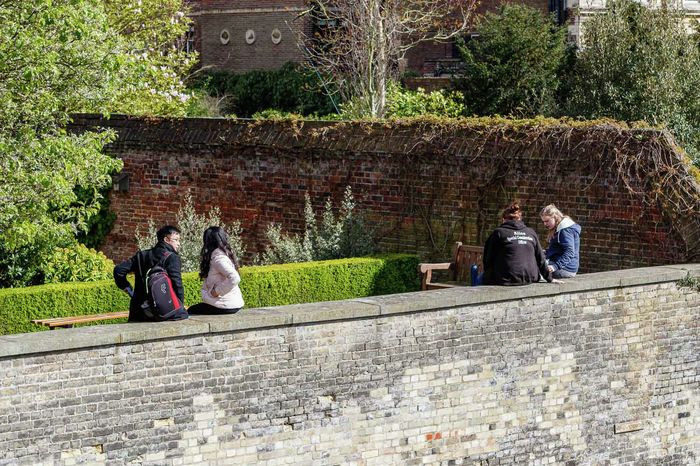Cambridge students are too opinionated
While our student culture encourages social awareness, Gabrielle Lee argues this is often performative

When friends from back home call and ask what people are like here, I often laugh and reply that everyone at Cambridge has a bike and an opinion. Whilst I say this mostly in jest, in my time here I have yet to come across a student who is completely uninterested. I find that most have strong opinions about their field of study, their university, their interests, or the world at large, even if it’s not relevant or evident at first. In fact, it feels like conversations at Cambridge err in this direction more often than not; even upon first meetings, talking politics or global affairs rather than pleasantries is common.
Whilst this awareness from peers is often eye-opening, it also means conversations can descend into argumentative or hostile territory. After all, whether it be over dinner at College, drinks at a pub, or class discussions, everyone has something to say, and people are not afraid to disagree. It seems somewhat inevitable, considering peoples’ opinions are oftentimes accompanied by conviction, background, and sometimes even a formal education in the field.
I do wonder, though, whether it’s truly for the better. There doesn’t seem to be space to be unaware or disengaged at Cambridge, even though young adulthood is the very time when most get it wrong or change their minds as they leave their hometowns, explore their beliefs, and discover new information.
“There doesn’t seem to be space to be unaware or disengaged at Cambridge”
What’s more is that the student culture and the university’s social scene only fosters this attitude of consciousness. It’s not exactly typical for young adults to spend their Monday afternoons listening to a speaker, their Wednesdays mornings creating a quiz for a society, and their Thursday evenings at the debate, but it’s easy to forget that in this city. Here, it’s normal for people to construct their social lives around intellectual pursuits. It’s desirable if you’re a part of all that, and knowing is a type of social and personal capital that allows you to join the in-crowd. If anything, there’s significant portions of the university’s social scene that you’d have to avoid if you didn’t want to get involved in anything political or intellectual. Often, you’re an anomaly if you simply don’t care about any of that.
I’m curious, sometimes, whether students are like this here because the student culture has normalized it or because Cambridge appeals to and admits a certain type of person. Part of me guesses that students see this sort of consciousness surrounding them and then feel the need to display their ability because that’s how they prove that they belong. Maybe they think that that’s who they have to be because they’re here, because they can’t just be floundering and naive when they’re Cambridge students, after all. The other part of me supposes that the university only admits people who have some sort of academic interest in the first place. Maybe it’s no wonder that, beyond the classroom, Cambridge’s culture caters to this aspect of people’s personalities when it’s ubiquitous in the student body.
“They can’t just be floundering and naive when they’re Cambridge students, after all”
Maybe it’s the former. Maybe it’s the latter. Maybe it’s some cocktail of both that I’ll never figure out. I’m certainly guilty myself, and find that conversations with friends here often end up centering on politics or the news even though I have just as much interest in talking about my family or who I ran into at the grocery store. Discussion never seems to stubbornly gravitate back toward these topics with people I know from elsewhere, but here, these talks are almost inescapable.
Whilst this behaviour is helpful in class and at societies, having this sort of heightened and expected consciousness bleed into so many aspects of social life sometimes feels unnecessary and performative. It means I hear people drone on about the governance or economy of certain countries when they have no personal stake or education in the matter, just so they can prove a point or contribute to the conversation. It also reminds me why it’s gauche to talk about religion, politics, or finance at the dinner table. These topics are sensitive, and can easily bring about disagreement and friction, especially when those speaking are not the most knowledgeable or personally involved. Not everyone wants to speak on contentious matters or spend dinner trying to prove that they know just as much as whoever’s sitting next to them – and that’s normal. That careful disengagement is standard almost everywhere.
And yet, at Cambridge, it persists. You walk into town for a coffee, meet an overeager and verbose friend of a friend, and suddenly, a stranger’s asking for your opinion on the British economy or Marxism. And you better be prepared, because certainly expecting you to give an answer, whether you want to or not.
Want to share your thoughts on this article? Send us a letter to letters@varsity.co.uk or by using this form.
 Comment / Cambridge’s tourism risks commodifying students18 April 2025
Comment / Cambridge’s tourism risks commodifying students18 April 2025 Comment / Cambridge students are too opinionated 21 April 2025
Comment / Cambridge students are too opinionated 21 April 2025 News / Varsity ChatGPT survey17 April 2025
News / Varsity ChatGPT survey17 April 2025 News / Cambridge researchers build tool to predict cancer treatment success19 April 2025
News / Cambridge researchers build tool to predict cancer treatment success19 April 2025 News / Greenwich House occupiers miss deadline to respond to University legal action15 April 2025
News / Greenwich House occupiers miss deadline to respond to University legal action15 April 2025





